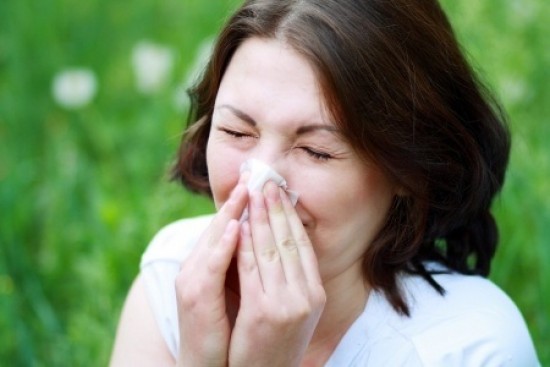Springtime can be wonderful, especially if you live in an area where the winters seem to drag on. The blooming flowers, buds on the trees and the appearance of green can bring you back into a happier state of mind. However, springtime also means that the presence of pollen, dust and allergens increase, causing your to feel foggy, stuffed up and uncomfortable.
You're not the only one who is miserable.
In fact, according to the American College of Allergy, Asthma and Immunology, 16.9 million adults and 6.7 million children suffer from seasonal allergies.
Allergy symptoms can often mimic the symptoms of a common cold. How do you really know the difference and when to seek medical attention?
Typically, allergy symptoms include an itchy nose, skin or eyes, runny nose, watery eyes, and feeling congested. These symptoms also occur seasonally, especially in the spring and fall. A stuffy nose can indicate a cold, but you won't have the itchiness. Symptoms of a cold also include body aches and fever.
If you do suffer from seasonal allergies, it's important to have a plan of medications that work specifically for you. Medications that work for your friends or family won't necessarily work effectively on you.
How do you know which medication works best for your individual needs?
There are so many options available, from nasal sprays and nasal steroids to antihistamines. Some are available over the counter and some require a prescription. If you're feeling overwhelmed, don't hesitate to ask a pharmacist or your doctor for help.
What are some ways to reduce your allergy triggers?
If your allergies are extreme, make sure to look at pollen counts before heading outside. You may not like it, but you might have to skip a nice day or two and stay inside. Another helpful tip? Cover your pillows with specific allergy protector pillowcases, which will help lessen your exposure overnight.
What else do you need to know about your allergies?
Chief Medical Officer and Group Vice President of Walgreens, Dr. Harry Leider, discusses the difference between allergies and colds, home remedies for your allergies and other effective treatment options available to ease your allergy symptoms.

Seasonal Allergies: What Treatment Is Best for YOU?
Guest
Info & Links: Harry Leider, MD
From the Show: Staying Well
Summary: According to the American College of Allergy, Asthma and Immunology, 16.9 million adults and 6.7 million children suffer from seasonal allergies.
Guest Bio: Harry Leider, MD
 Dr. Leider, is a board certified internist, with over 20 years experience as a physician executive in a variety of diverse and innovative healthcare organizations.
Dr. Leider, is a board certified internist, with over 20 years experience as a physician executive in a variety of diverse and innovative healthcare organizations.He currently is the Chief Medical Officer and Group Vice President of Walgreens, and in this role is responsible for ensuring enterprise-wide health and wellness service offerings and outcomes that provide customer value and improve patient lives.
Prior to joining Walgreens Dr. Leider was Chief Medical Officer and Senior Vice President of Ameritox, Inc., a national medication adherence testing company. Prior to joining Ameritox, Dr. Leider was Chief Medical Officer of XLHealth & Care Improvement Plus, a large national disease management firm and Medicare managed care organization specializing in providing care management services to individuals with chronic illnesses.
At XLHealth he was the senior executive responsible for all healthcare program development, quality improvement initiatives, and professional training within the company. Prior to joining XLHealth, Dr. Leider was Senior Vice President of Interactive Forums, Inc. a national healthcare market research and medical education company; and founder and President of IFI Health Solutions - its consulting division.
In this role, he developed and delivered services to a broad range of healthcare technology, managed care, provider, and pharmaceutical organizations - providing expertise in the areas of disease management, leadership training for physician executives, clinical quality improvement, and qualitative market research.
In addition to his extensive background in disease management, market research, and healthcare consulting, Dr Leider has broad experience in managed care. He served as the Chief Medical Officer and Senior Vice President of Health Services for HealthNet, a large hospital-owned managed care organization in Kansas and Missouri, and developed of all of the care management programs for multiple new health plans.
Previously, Dr. Leider was the Health Center Director for the Boston Health Center of Harvard Community Health Plan, one of the country's leading managed care organization. In this role, he was the senior executive responsible for the operation of a large, urban, multi-specialty health center that employed over 40 physicians, 200 staff, and served over 25,000 members.
From a corporate perspective, he participated in company-wide initiatives in the areas of strategic planning, pharmacy utilization management, and clinical quality improvement.
Dr. Leider has received national recognition for his innovative approach to developing care management programs for populations with chronic illness, educating physicians on how to be more effective leaders, and teaching clinicians how to improve the quality of healthcare.
He speaks frequently to national audiences and serves as a fellow, core faculty member, and past board member for the American College of Physician Executives. In addition to his faculty role at ACPE, Dr. Leider currently serves as a Professional Faculty member at the Johns Hopkins Carey School of Business.
Dr. Leider's publications have appeared in a variety of peer-reviewed journals and books including the American Journal of Managed Care, the journal Population Health Management, The Physician's Guide to Managed Care by Aspen Publishers, and two books published by ACPE: Essentials of Medical Management and Practicing Medicine in the 21st Century.
He also serves on the editorial boards of the Physician Executive Journal, and Population Health Management.
Dr. Leider served on the board of the American College of Physician Executives and was a recent Chairman of the Board and the organization's Past President. He was a founding board member of the Disease Management Association of America (DMAA) and previously served as chair of DMAA's Medicare Committee. He also served on the Board of the Institute of Aging at the University of Pennsylvania.
Dr. Leider obtained a BA from Pennsylvania State University, earned his MD from the University of Pennsylvania School of Medicine, and while a Robert Wood Johnson Clinical Scholar, earned his MBA from the University of Washington.
In addition to Internal Medicine, he is board certified in Medical Management and is a fellow of the American College of Physician Executives. He served for six years as an attending physician at Brigham and Women's Hospital in Boston and as a faculty member at Harvard Medical School.
- Organization: Walgreens
More from this show . . .
Healthcare Reform: New Role of the Community PharmacyWhy Are Minorities at Greater Risk for Diabetes?
Prev
Next
Healthcare Reform: New Role of the Community PharmacyWhy Are Minorities at Greater Risk for Diabetes?




